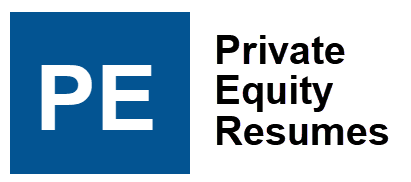Private Equity Resume Sample
As you apply for a position in private equity, the headhunters or prospective employers reading your resume will want to read about your significant experience in the field. Additionally, they will want to see evidence of your preparatory coursework from a top college or university and well-honed critical thinking and soft skills. Most of all, it is important to have a resume that stands out in this very competitive field. Here is a comprehensive guide to assist you in creating the perfect resume to land your dream job in private equity.
Things to Keep in Mind When Writing Your Private Equity Resume
When quickly reading over your resume, headhunters or hiring managers want to quickly see proof of your qualifications for the desired position. Therefore, your resume should be:
Formatted: Detail the most pertinent information about your breadth of skills, relevant internships and employment, and education and degrees into clearly marked sections. Your resume should never take up more than two full pages.
Specific: Although some parts of the resume will be consistent, such as your education, it is important to highlight the most relevant information in your skills and work history to the job for which you are applying. Utilize the requirements in the job posting as well as anything you know about the hiring firm to help you know what they are looking for.
Enticing: In the private equity field, you will need to sell yourself to your employer through the deals that you have made or think that you could close. This field is all about relationships, networking, and securing financing from investors, so make sure to highlight these experiences on your resume, even if you don't have many to pull from.
Easy to Read: Use a standard font and size on your resume. Additionally, use bullets to help organize information in each section so that it is easier for the employer to quickly understand what you have to offer.
The layout and contents of your private equity resume is important. It is the employer's first sense of your experience, skills, and how you present yourself. Here is more detailed information about what you should include in each section to increase your chances of getting to the next step of the process.
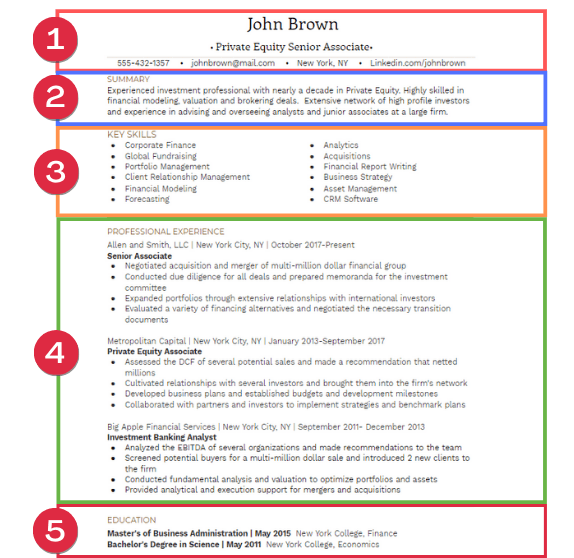
Section 1: Your Contact Information
The first section of your resume should detail all of your pertinent contact information. It should include your name, home address, telephone number, and email. You may also want to list a website professional social media account, such as LinkedIn, that highlights your relevant skills and experiences.
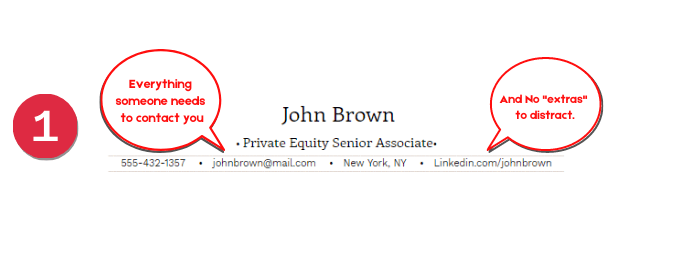
It is important to ensure that your email address is professional and that any additional links or accounts that your provide are appropriate and relevant.
Section 2: The Summary
The summary section is intended to serve as a brief snapshot of your strengths, experience, and aspirations that align with the goals or purpose of the company. In this section, you should highlight your most pertinent skills and work experience to attract the headhunter or employer to want to learn more about you. The summary section is typically 2-4 sentences that weave together the most relevant and important information from the subsequent sections of the resume.
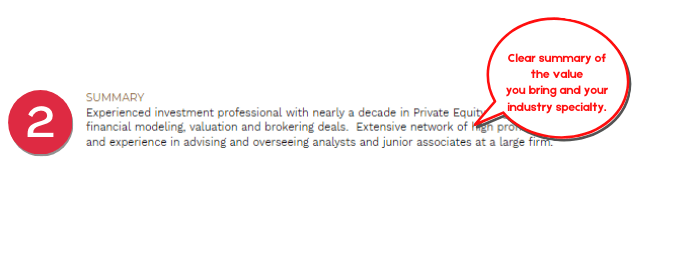
Remember that the summary is an overview and does not need to cover all of your specific skills and experience. The other sections of the resume will permit you to discuss these in more detail. The role of the summary is simply to attract the attention of the reader and encourage them to read on and learn more about you.
Section 3: Core Competencies
This section provides an opportunity for you to showcase the skills that you have honed that would make you a good fit for the firm. Using bullets, you should list between 12 and 15 succinct competencies to highlight your skills and accomplishments for the reader.
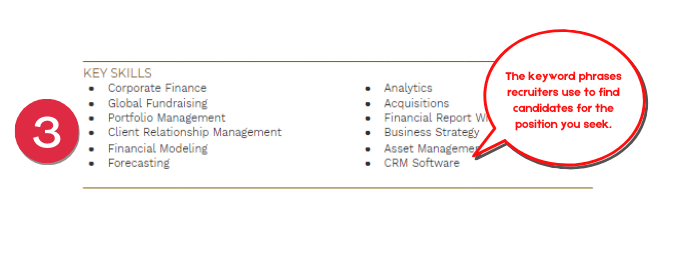
Since private equity firms typically use headhunters to seek out new talent, you will want your resume to appeal to these individuals in order to get called for an interview. It is essential to ensure that this section touches on your critical thinking, networking, and deal-making skills, as these will be most attractive to a potential employer. While you should not lie about your experiences or competencies, if you are new to the field you can flesh out these areas with skills that you have demonstrated in your coursework and internships.
Section 4: Professional Experience
The bulkiest portion of your resume will be the list of your previous work experience. Your jobs should be listed in descending chronological order, with the most recent listed first. In order to make this section easy to peruse, you will want to follow a format. As you detail each position, begin on the first line by listing the name of the firm or organizaiton, their location with city and state, and the dates that you worked there, including month and year.
On the next line, explain your job title in a few words. For example, "Investment Banking Analyst" or "Private Equity Associate" will cue the reader into the role that you played within that organization and what to expect from your experience.
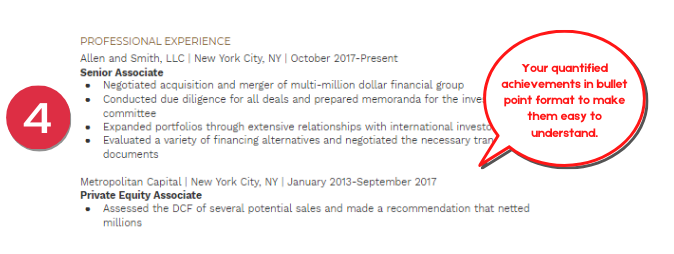
Beneath this line, provide a bulleted itemization of your main responsibilities, achievements, and skills that you developed and demonstrated in the role. This is the place to build up your worth to the organization and showcase the ways that you benefitted your firm. You will particularly want to highlight the deals that you brokered, or, if your only experience is in an internship-level position, discuss potential deals that you could have closed on. For example:
Screened potential buyers for a multi-billion dollar transportation company and introduced 3 new candidates to the firm.
Analyzed the EBITDA for several multi-million dollar hospitality organizations and recommended the most profitable to the team
Assessed the DCF for several potential sales and selected an option that brought millions of dollars into the firm
While you may have participated in securing many deals for your firm or completed several work experiences, resist the temptation to list every accomplishment. Consider the position that you are applying for and list the most relevant skills and experiences that the reader will be looking for. If you have only completed internships so far, you can stretch some of your accomplishments and skills by detailing deals that you could have closed, or how you supported associates and others in doing so.
Section 5: Education and Licensure
The last section of the resume provides a place for you to showcase your foundational knowledge. When you list your undergraduate education, first state the degree that you achieved, the school you attended, and the year you graduated. You may choose to include your GPA or other accomplishments, as credentials can be very important in this industry.
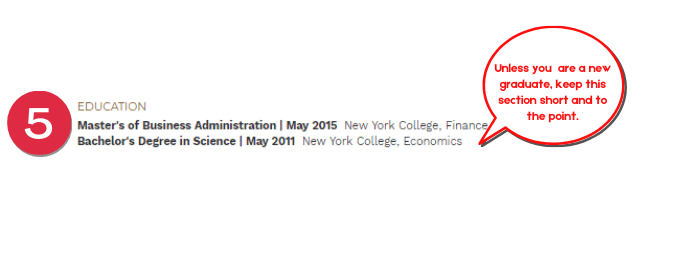
If you have completed an MBA, list this in a similar format. Since the MBA is the highest degree, this should be listed first with the undergraduate degree listed below.
Putting It All Together
As you examine your resume in totality, consider its visual appeal. It should catch the eye and appear organized without being distracting to the reader. You will also want to proofread the entire resume carefully in order to avoid typos or spelling errors. Asking a trusted friend, family member, or colleague to read it over can help ensure that you are in the best position possible to land the job of your dreams.

To help guide your final review, ask yourself these questions:
- Did you use strong, action-based language throughout?
- Were you consistent with the tense?
- Did you use proper grammar from top to bottom?
- Are there area where you could cut out words to make things simpler and easier to understand?
- What bullet points still include unquantified activity? Can you add some numbers to those?
Finally, the BIG question... does your private equity resume tell your story, clearly and concisely?
If the answer is an unqualified "Yes!" then you should be good to go.
If not, then perhaps now would be a good time to reach out for some professional help.
